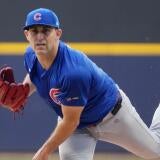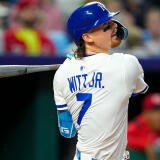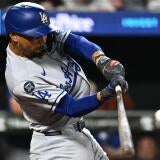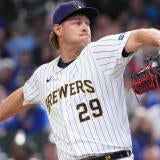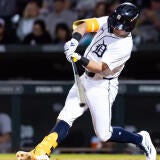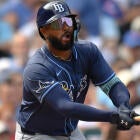This just in: Dice-K will be more than OK
Our Eric Mack took in Daisuke Matsuzaka's major-league spring debut and came away with increased expectations from a Fantasy perspective.
JUPITER, Fla. -- The Dice-man cometh. Well, almost half of him at least.
Daisuke Matsuzaka, the Red Sox's $103.11 million Japanese import, made his spring debut against big-league hitters Tuesday, in front of some 150 media members, his boss and a sellout spring-training crowd.
The hype will only grow from here.
"My degree of readiness is tough to say from the outside," Dice-K said, through Red Sox interpreter Masa Hoshino, in his well-attended news conference afterward. "It's difficult to rate myself, but I am probably 40-to-50 percent there."
We can't wait to see 100 percent.
His line: three shutout innings, 47 pitches, three strikeouts, a walk, two hits and a fastball topping out at 151 km, according to a Japanese television station, the equivalent of 94 mph.
"I wasn't overly concerned either way," he said in his first true start after Friday's warmup against Boston College. "I am just preparing myself mentally to pitch against big-league hitters."
The results don't matter as much as the most important thing to take out of the day: We have underestimated the strength and resiliency of Dice-K's right arm. The 6-foot, 187-pounder with thick legs and a nifty half-Hideo Nomo windup -- at times stopping to rest his wrists on his hat and do a hip-thrust shimmy -- looks like a workhorse. Our 2007 Fantasy projections of 211 innings and 14 wins might have been a bit too cautious.
We adore the Japanese throwing program the Red Sox are allowing him to work on. It's one that had him throw a 103-pitch bullpen session earlier this spring and then a 50-60 pitch session the day before his first start against big-league hitters. Both practices are unheard of in American baseball, where arms are far more coddled and far less conditioned for heavy work.
"That's what he's accustomed to," manager Terry Francona said. "It's a continual feeling-out process on both sides. At this point we're just trying to get to know him, and he's trying to get to know us."
As if his workday wasn't enough, 47 pitches (31 strikes), Matsuzaka tossed another 35 times at varying distances in the bullpen, before doing his running and hitting the ice.
"Nice job, buddy," Orestes Destrade, a three-time Japanese home-run and RBI champ, told him as he walked into the clubhouse.
"They're used to throwing 100-150 pitch bullpen sessions before they pitch a game," Destrade said of the Japanese pitching program. "It's odd. I don't agree with that.
"The potential for harm is great. I know they have less injured pitchers over there. They have Pedro Borbon arms. Maybe they're on to something. The more you throw, the less chance for injury, perhaps, but I don't agree."
Borbon is a former Reds reliever from the 1970s who averaged almost 126 innings of relief a year for six years during his prime, topping out at 139 innings. That's unheard of nowadays.
"It has been working for him, but they might try to tone him down a little," Destrade continued.
"... Daisuke has legendary status. I wish him luck. I just hope he doesn't put too much pressure on himself."
But like Matsuzaka's aggressive program, the energy of his starts and his vast following are pulling us in.
After watching Tuesday's start -- despite it being against half of the Marlins' starting lineup (most of them young, Hanley Ramirez, Dan Uggla, Jeremy Hermida and Miguel Olivo) -- we decided to bump Matsuzaka's projections up to 15 wins, 220 innings and 190 Ks. His durable, well-conditioned arm will allow him to throw a lot of pitches and work far deeper into games than any rookie we have ever seen.
That moves him from a top-20 Fantasy starter and into the top 10. He's behind just Johan Santana, Roy Halladay and Josh Beckett in the AL. We should also mention, he's our new No. 1 rookie to target on Draft Day, surpassing the Devil Rays' Delmon Young.
"He's definitely got the ability to be a dominant pitcher," said Uggla, who smacked a 1-2 fastball away in the first for one of the two hits off him. "He's got the stuff; he's got the command.
"He has done it in Japan, and there's no reason he couldn't do it here."
Does he throw hard? Hard enough. But it's the fact he's a pitcher in the truest sense that is exciting.
"This thing about this Japanese pitcher is the command," said Bill Gullickson, a former 20-game winner who also spent time pitching in Japan and was in attendance Tuesday. "You watch, later in the year, his control when he's behind in the count is nasty."
Matsuzaka fell behind in the count with a man on first in the second inning and journeyman John Gall struck a ground-rule double to right center, which kept the runner from scoring. It was a fastball away, like the one Uggla hit.
"The count dictated it and we made him hit it to the biggest part of the park," catcher Jason Varitek said of the pitch selection.
"We're just getting an awareness of what we need to do. He's progressing like all pitchers right now. Good changeups, good sliders. ... He has enough weapons to utilize that we can do different things."
Matsuzaka worked out of the jam, striking out Scott Seabol after a brief visit from Varitek.
"Slider inside. Can you do it?" Varitek asked in english.
Matsuzaka responded, "Yes."
"I put it right where he wanted me to throw it," Matsuzaka said.
Then, throwing his hardest pitch of the day, 94 mph, he got Eric Reed to pop up a bunt attempt to end the threat (second and third and one out).
"I am trying to focus on, if I allow runners on the bases, keeping them there," Matsuzaka said.
What the rookie kept best was his composure.
"I didn't even realize it was his first time facing major-league hitters," Varitek said. "He handled himself very well."
The question now for us in Fantasy leagues: Will the juice be worth the squeeze on Draft Day? Matsuzaka will be drafted among the best of the best, but he will have to be as good as Nomo was as a rookie (13-6, 2.54 ERA and 236 strikeouts in 191 1/3 innings) for it to be worth it.
"Hideo Nomo is one of the best pitchers I have ever faced," said Destrade, who has become a spokesperson of sorts for Japanese imports. "Nobody else had the 'you know what' to take (his game to America). If he would have failed, he would have been very embarrassed in his country."
Destrade, while very fond of Matsuzaka, says he wasn't even the best Japan had to offer now.
"There's a better kid over there than Daisuke," Destrada said, referring to Kazumi Saito, who was 18-5 with 1.75 ERA in 26 starts for the Fukuoka SoftBank Hawks last season. "They were 1 and 1a. He's sick and even better than Daisuke."
Matsuzaka wasn't too shabby himself, going 17-5 with a 2.13 ERA and 200 strikeouts after being the MVP of the first World Baseball Classic. His credentials and stuff were impressive enough to get owner John Henry and company to lay down $51.1 million just to negotiate.
"He's already thrown a lot of pitches," Henry said before the game, cognizant of the workload his big investment is taking on this spring. "He's working on things in spring training like everyone and he's adjusting to throwing a different size baseball.
"It's a big day."
A day and a game that almost never got off, by the way.
The Red Sox showed up late because the team's bus driver -- "doing his last trip," according to Francona -- got lost on the three-hour trek from Fort Myers to Jupiter. Luckily, Matsuzaka was prepared for his debut, having arrived the previous night.
"It was my idea (to allow Daisuke to come the night before)," Francona said. "I am glad I did it. For an important start like this, it wasn't going to be good to be riding three hours and 45 minutes on a bus. I gave him that option and he took it. I am glad he did."
And they continue to give him the option to stretch out his arm in spring training the Japanese way.
The Dice-man cometh, and goeth, as he pleases. As long as what he does works and it doesn't get him injured.
